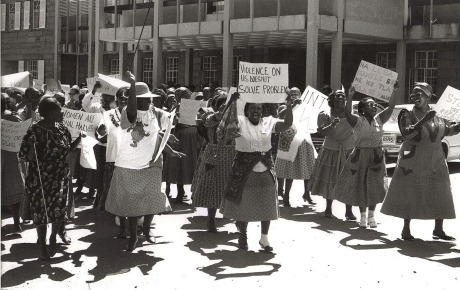
Today, exactly ten years ago, Nelson Mandela received the Nobel Peace Prize. 2013 is also, and will now even more remain, a year of celebration to commemorate South African history. Kalpana Hiralal reminds us of women’s heroism in the freedom struggles in South Africa.
The passing of Nelson Rolihlahla Mandela, an iconic statesman, has plunged the world into deep sorrow. For South Africans, he was the “Father of the Nation”, our beloved “Tata”. Tuesday 10 December marks the official marking of his laying to rest before the burial in Qunu on Sunday, 15 December, on the eve of the Day of Reconciliation. During Mandela’s imprisonment on Robben Island, women played a key role in the “Free Mandela” campaign. Equally important is women’s contribution to the freedom struggle in South Africa. Below is a brief account of their contributions and commemorative events of 2013.
Since the turn of the century women have been at the forefront of the struggle in South Africa. They have been active in collective organization, in anti-pass protests, and marches. Many were jailed and persecuted and many became the face of the resistance against the apartheid regime. But this year 2013 is particularly significant in honouring and remembering women’s contribution to the struggle in South Africa.
This year marks the: Centennial celebration of the 1913 march by African women against passes in the Orange Free State; Centennial celebrations of the 1913 Satyagraha movement and the 50th anniversary of the march by Indian women in 1963 in Pretoria in defiance of the Group Areas Act.
In 1913 Women in the Free State took to the streets against the notorious pass laws, which the OFS government introduced. The new legislation required women to carry passes. The pass laws were designed to segregate the population and severely limit the movements of the non-white population. Hundreds of women marched against pass laws to the Mayor’s office in Bloemfontein. In 1918, the government threatened to re-introduce pass laws for women and the protests continued. This march laid the foundation of the first formal women’s organization, the Bantu Women’s League which later became the ANC Women’s League
In 1913 thousands of Indian men, women and children participated in the Satyagraha struggle against discriminatory legislation which stifled their economic, social and political freedom. Women played a pivotal role in mobilising the support of indentured workers on the mines and railways in the Natal Midlands. Women wrote petitions, defied by-laws of hawking and trading, challenged the immigration laws by moving inter-provincially without permits, heckled policemen and bellowed at labourers to cease work, kept morale high and endured imprisonment. Among the women who were imprisoned was a teenager Valliamma Moodley, Kasturba Gandhi (wife of Mohandas Gandhi) and Jagrani Devi, imprisoned with her infant son Ramdutt. Women who did not endure imprisonment assisted in looking after striking families, providing food and accommodation to satyagrahis and provided moral support.
On 10 December 1963, approximately 400 Indian women, led by Zainub Asvat, marched to the Union Buildings in protest against the Group Areas Act. They marched wearing white saris – a sign of mourning, symbolic of the sorrow they felt about the future in relation to the Group areas Act, to present a protest to the Prime Minister on the application of the Group Areas Act. Police used police dogs to disperse the women who had come from many parts of the Transvaal to Pretoria. In spite of strong opposition from Security Branch men and dog handlers, the women reached the West wing entrance and showed defiance.
The cited events above are indicative that women played a pivotal role in the struggle to free South Africa. They were not bystanders, but were active participants throughout the years. By engaging in these activities women broke out of their traditional boundaries, coalesced massive support for the struggle and challenged gender stereotypes and roles. Thanks to the struggles of women, South Africa’s Constitution recognises women as equal citizens, with equal rights and responsibilities.

